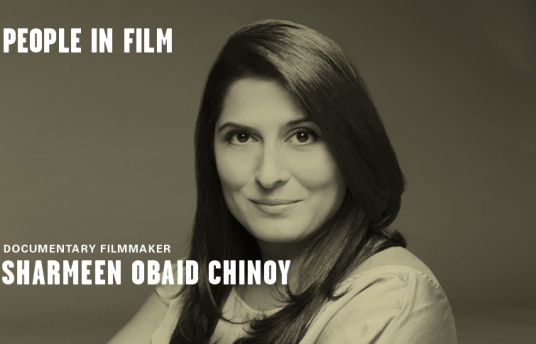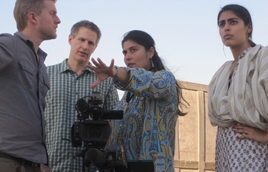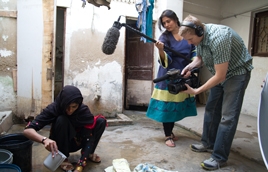People in Film: Sharmeen Obaid Chinoy
Jul 17, 2012

Sharmeen Obaid Chinoy’s “Saving Face” won this year’s Academy Award for best Documentary (Short Subject).
The film, which follows survivors of acid-related violence, became the first by a Pakistani to win an Oscar.
Born and raised in Karachi, Sharmeen studied in the US and has worked on 16 films across 10 countries. In April, Angelina Jolie wrote her profile as one of Time Magazine’s 100 most influential people.
Here, she tells us how it felt to win one of the industry’s highest honours and explains why filming in Pakistan isn’t as difficult as you might think.
Saving Face - Trailer
إعلان فيلم سايفينغ فايس
DFI: What was the first emotion you felt when you heard your name being called at the Oscars?
OC: Shock is not an emotion, but that is the first thing that I felt. My heart stopped and I didn’t move until I saw Daniel Junge (“Saving Face” co-director) running down the stairs towards the stage.
DFI: In terms of motivation, how did winning affect you?
OC: Winning the Oscar was a testament to my long-held belief that if you work hard and strive for excellence, the world will appreciate your product and your efforts will be recognised. The worldwide attention that it brought to the subject of the film is even more of a reward; it solidified my drive.


Behing the scenes of 'Saving Face'
DFI: Of all the characters in “Saving Face”, who inspired you the most?
OC: I met the subjects through Acid Survivors Foundation- Pakistan. Zakia, one of the leading characters, inspired me the most. Attacked by her husband, she fought for his imprisonment and separated herself and her children from him. She is a courageous and resilient woman who managed to stay strong in the face of unimaginable conditions. It is subjects like her that motivate me to work harder.
DFI: What have you been up to since then?
OC: Working on my next film and multiple projects with my team. We have been producing a documentary series about change-makers in Pakistan who are working for the betterment of their communities. “Ho Yaqeen” (Have Belief) is already being aired on Pakistani television. We’re also working on a socially motivated animated series, geared towards Pakistani children.
DFI: You’ve also made a documentary on boys being sucked in by the Taliban in Pakistan. Why does Pakistan need people to tell its stories?
OC: So that the world can learn about marginalised societies’ conditions and circumstances from their perspective. “Pakistan’s Taliban Generation” forces the world to look at a toxic phenomenon from a humanistic perspective. It allows them to understand the process whereby children in Taliban-infested areas are recruited, and how the cycle is reinforced. Seeing the children’s perspective is important as that is not what meets the headlines.
DFI: Do you face barriers in Pakistan as a female director?
OC: The mind-set of the people is the most challenging component of filming. When I was working in the Saraiki belt, an area characterised by high unemployment rates and low literacy, the people were wary of my team and I. But after spending substantial time on the ground and establishing relationships, we were able to gain the trust of a few brave subjects who wanted to speak out and create awareness.
In fact, because I am a woman filmmaker I can easily work with female subjects. They welcome me into their homes and allow me to survey their lives – something essential before you start filming a subject. While working in Taliban territories I found that men resorted to treating me like a man because they were not used to seeing women in the given settings.
DFI: In your view, documentary makers should be…
OC: Objective, perceptive and ethical.
DFI: Other than the subject, what is important in documentary making?
OC: A filmmaker must be able to see the beauty in everything and effectively capture it on screen. The music and aesthetics of the film are very important and supplement the subject matter by delivering an engaging film.
DFI: Which documentary would you recommend as the most powerful?
OC: “Iraq in Fragments”. (It) effectively captures the consequence of war.
DFI: Other than documentaries, what other films do you enjoy?
OC: I really enjoy classics such as Gone with the Wind.
DFI: Where can people view your documentary?
OC: There may be a broadcast in the Middle East in the near future. Here’s hoping!